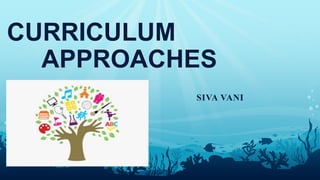
Curriculum approaches
- 2. Each Approach Expresses a Perspective About Curriculum DevelopmentWhich Impact The design of the curriculum The role of schools, administrators, teachers, learners, curriculum specialist Requirements for evaluation and implementation
- 3. Philosophy View of Reality History Psychology Social Issue Domains of Knowledge
- 5. CurriculumApproachesareDividedintwoCategories Technical-Scientific Category Non-Technical/Non-ScientificCategory Reflect a traditional orientation about education and formal methods of schooling Involves a logical step-by-step procedure of problem solving. Focus on the end product & performance of the student. Subject centered design. Backward design aligns under the technical category. Challenge traditional theories and practices and reflect the more progressive views about education. Focus on the process and personal relevance for the student. Learner centered & problem centered design.
- 6. Behavioral-RationalApproach BytheTabaandTylerModels,1969 Most RecognizedTechnical Scientific Models 1. The RalphTyler Model: Four Basic Principles 2. The HildaTaba Model: Grass- roots Rationale 3. The Francis Hunkins Decision- Making Model It is the oldest and still more preferred approach by many educators It clearly defines the objectives (why), content (what), method (how) sequence (when), scope (how much) of a curriculum
- 7. SystemsorManagerialApproach This approach considers the major connectedness of inputs, throughputs and outputs that comprise the educational system. This approach emphasizes the managerial/leadership and supervisory aspects of curriculum especially in the implementation and organization process. Curriculum is viewed as the major system and the other processes related to it such as supervision (motivation, leadership styles, communication and systems (decision making), instruction and evaluation subsystems.
- 8. The managerial approach The managerial approach became a dominant curriculum approach in the 1950's and 1960's. The principal is the curriculum leader and at the same time instructional leader who is supposed to be the general manager.
- 9. The managerial approach General Manager is sets the policies and priorities, establishes the direction of change and innovation and planning and organizing curriculum and instruction.
- 10. The managerial approach Curriculum managers look at the curriculum changes and innovations as they administer the resources and restructure the schools. Roles of the Curriculum Supervisors (Ornstein and Hunkins, 2004); 1. Plan curriculum with students, parents, teachers and other stakeholders. 2. Help develop the school’s educational goals.
- 11. The managerial approach 3.Design programs of study by grade levels. 4.Plan or schedule classes or school calendar. 5.Prepare curriculum guides or teacher guides by grade level or subject area. 6.Help in the evaluation and selection of textbooks.
- 12. The managerial approach 7.Observe teachers. 8.Assist teachers in the implementation of the curriculum. 9. Encourage curriculum innovation and change. 10.Develop standards for curriculum and instructional evaluation.
- 13. System Approach • The systems approach to designing curriculum, is also called instructional systems design (ISD). • The system approach to curriculum was influenced by system theory.
- 14. The systems approach Ornstein & Hunkins (1993) states that the main feature of the systems approach is the interconnectedness of different programs and content areas included in curriculum, while serving as an index of how the school is restructuring and reculturing.
- 15. The systems approach The systems approach involves curriculum integration, relevancy character to participants, monitoring mechanisms, evaluating procedures and practices forming part of curriculum implementation (e.g. systematic evaluation).
- 16. The systems approach In accordance with Clark (1989:3), the system approach or instructional design may be understood as: ―a systematic model used to plan, design, develop, and evaluation training, which includes the following components: (1) a needs analysis; (2) a task analysis; (3) a definition of learning objectives; (4) the development of an assessment plan; (5) the development of learning material; (6) a plan to try out with revision (pilot) and (7) the implementation of the final product.
- 17. The systems approach Critics of ISD approach complain that it lacks flexibility in the sense that it presupposes a closed and predictable system. Another objection to the ISD approach is that the process from inception to implementation takes too long, given the pressure of occupational demands that teachers have to meet.
- 18. The academic approach The academic approach attempts to analyze and synthesize major positions, trends, and concepts of curriculum.‖(Ornstein & Hunkins1993) This approach is concerned with comprehensive domains of schooling, including the study of education.
- 19. The academic approach It is usually scholastic and theoretical, hence, also referred to as ―traditional, encyclopedic, intellectual, or knowledge-oriented approach‖ Hewitt (2006:162) suggests that the academic approach curriculum included the traditional study of English, reading and writing, with attention to grammatical construction, pronunciation, writing style, and correct speech.
- 20. The humanistic approach This approach is rooted in the progressive philosophy and child- centered movement. According to Ornstein & Hunkins (1993), the humanistic approach is underpinned by child psychology with a view to coping with the needs and interests of children and by humanistic psychology with emphasis on valuing, ego identity, psychological health, freedom to learn, and personal fulfilment.
- 21. The humanistic approach The teacher therefore serves as facilitator and resource person for students. The curriculum mainly focuses on active interaction among students and teachers, on problem solving, and on inquiry. These procedures are included in the framework of the new curriculum.
- 22. The humanistic approach It considers the whole child and believes that in curriculum the total development of the individual is the prime consideration. The learner is at the centre of the curriculum.
- 23. Re-conceptualistic approach Reconceptualise approach is more concerned with change and reform. It stretches its curriculum to include ideological issues while investigating and influencing social, economic, and political issues. Theory is more important than practical applications. School is considered an extension of society and should be capable of changing society's future.
- 24. Re-conceptualistic approach A basic premise of reconceptualism is rooted in the principle that the more students understand themselves, the more they will understand their world. Thus, curriculum development is politically connected with the historical, economic and contemporary social frame of reference in a national and international context.